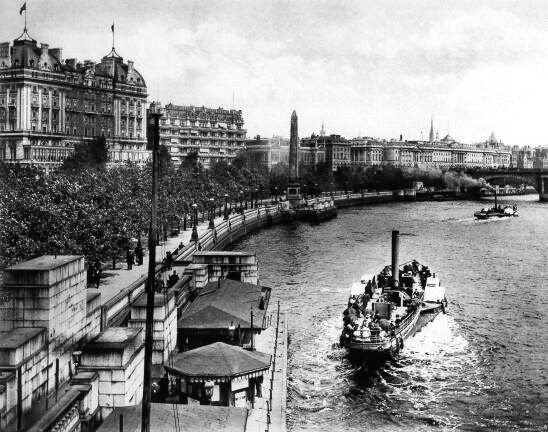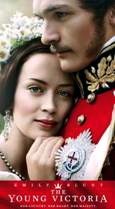
| |
Director: Jean-Marc Vallée, 2009
This lavish costume drama focuses on the turbulent and lonely years of Queen
Victoria's childhood, her accession to the throne when she was eighteen years
old, and the uncertain beginning of her long reign. Her eventual success as
a monarch was nurtured through two crucial relationships: her engagement and
marriage to her German cousin Albert, the prince-consort, and the political mentoring provided
by her first prime minister, Lord Melbourne.
© Sony Pictures
|
|
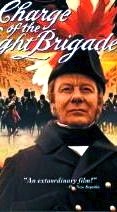
| |
Director: Tony Richardson, 1968
This film chronicles the events that led to British involvement in the Crimean War
against Russia culminating in the siege of Sevastopol and the fierce Battle of Balaclava
in October 1854. The climax is the heroic but doomed charge of British cavalrymen ordered
to advance against well-defended Russian artillery. Immortalized in the epic poem by Alfred,
Lord Tennyson, the Light Brigade's destruction owed primarily to the jealousy, infighting,
and gross incompetence of its aristocratic commanders. © MGM/UA
|
|
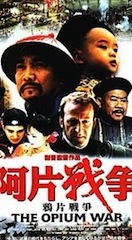
| |
Director: Xie Jin, 1997
This Chinese epic tells the story of the 1840-41 war between Britain and the declining Qing dynasty that resulted in the forced opening of Chinese markets to the opium trade and the establishment of the British colony of Hong Kong. Yapian Zhanzheng received enthusiastic support from the Beijing authorities and was the most expensive Chinese film ever made at the time of production. It was released in 1997 to coincide with the handover of Hong Kong.
© Araba Films
|
|
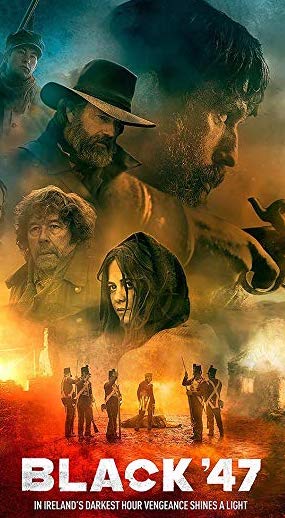
| |
Director: Lance Daly, 2018
Set in 1847, the worst year of the Great Famine in Ireland, this film follows Martin Feeney, a deserter from the Connaught Rangers, who returns from Afghanistan and India to his home in Connemara to rescue his destitute family. His vengeance against British constables and a local landlord make him a hunted man as he evades capture by the authorities. A graphic depiction of the devastation of the Irish Famine with some dialogue in the Irish language.
© IFC Films
|
|
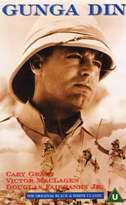
| |
Director: George Stevens, 1939
This classic film, starring Cary Grant and Douglas Fairbanks jr, was one of
the very first Hollywood depictions of India. Set in the nineteenth century,
three British soldiers and a native waterbearer must stop a secret revival of
the murderous "Thuggee" cult before it can spread across the land. The film is based
very loosely on Rudyard Kipling's 1892 ballad of the same name (though it is more like
The Three Musketeers) and is interesting for its stereotypes as much as for its story.
© RKO Pictures
|
|
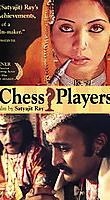
| |
Director: Satyajit Ray, 1977
In 1856, officials of the East India Company move to consolidate their
hold over North India by annexing the wealthy kingdom of Awadh. The chief minister to
the Nawab attempts to warn his ruler and local landlords of the impending danger
but they ignore him and instead indulge their obsession with playing chess.
The game becomes a metaphor for the larger game of politics played by the British as they
maneuver to capture Awadh's king. Based on the 1924 short story by Premchand.
© Shemaroo
|
|
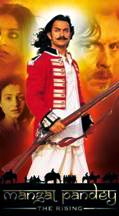
| |
Director: Ketan Mehta, 2005
This Bollywood epic is the first major film to focus on the 1857 Indian Rebellion—or
"Mutiny" as it is usually referred to in British history. The story follows the rebel
leader Mangal Pandey, an Indian sepoy in the service of the East India Company, and his
friendship with a British officer. Pandey was a real figure but one about whom little is
known. Filming began in 2003 and the opening scene was launched by Charles, Prince of Wales,
during an official royal visit to India.
© Yash Raj Films
|
|
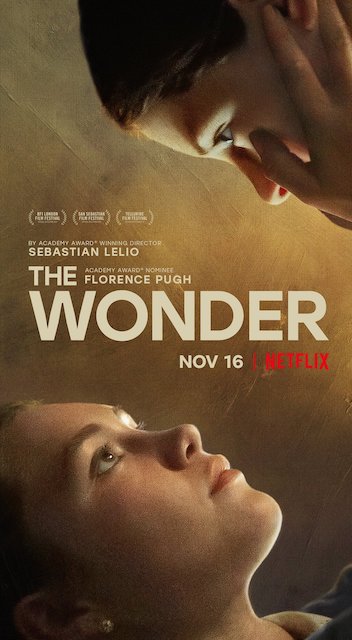
| |
Director: Sebastián Lelio, 2022
This psychological drama is set in the Irish Midlands in 1862. English nurse Elizabeth
Wright is brought to a small village to observe eleven-year-old Anna O’Donnell, who is
said to have survived without food for months but appears healthy. Is the village harboring
a saint or are there more ominous motives at work? A bleak and noirish look at religious
superstition and village politics in post-Famine rural Ireland. Based on the 2016 novel by
Emma Donoghue.
©
Netflixt
|
|
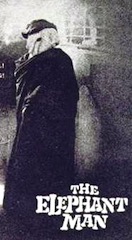
| |
Director: David Lynch, 1980
This gothic drama gives a moving portrayal of John Merrick, the grotesquely deformed
Victorian-era man better known as "The Elephant Man". Inarticulate and abused, Merrick
ekes out a miserable living as a sideshow freak until a dedicated London doctor,
Frederick Treves, rescues him from his former life and offers him an existence with
dignity and acknowlegement of his humanity. A well-rendered view of the Victorian medical community.
© Paramount
|
|
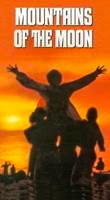
| |
Director: Bob Rafelson, 1990
This film traces the friendship between Victorian explorers Richard Burton
and John Hanning Speke that broke down during their 1856 expedition to find the source
of the Nile, a route that took them through East Africa from Zanzibar
to the shores of Lake Victoria. Based on the 1982 biographical novel by William Harrison
and the travel diaries of Burton and Speke.
© Artisan Entertainment
|
|
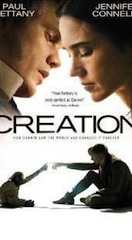
| |
Director: Jon Amiel, 2009
Charles Darwin, a brilliant scientist and devoted family man, struggles to come to
terms with the devastating loss of his eldest daughter, Annie. Worried that
his path-breaking theory of evolution might alienate his deeply religious wife
and endanger their marriage, Darwin had procrastinated completing his manuscript.
Yet the memory of his inquisitive, intelligent and highly logical daughter spurs him
to complete Origin of Species and send it off for publication.
© BBC Films
|
|
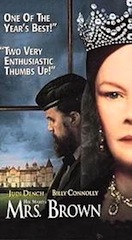
| |
Director: John Madden, 1997
This film examines at the relationship between Queen Victoria and John
Brown, a Scottish commoner who, though a servant, became her closest friend and
confidant. As such, he proved the catalyst to bring her back
into public life and out of her private mourning for the late Prince
Albert, who had died in 1861.
© Miramax
|
|
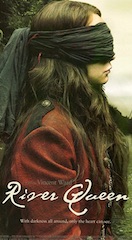
| |
Director: Vincent Ward, 2005
A lavishly filmed and intimate story set in New Zealand in the 1860s during the war between British
settlers and the Maori tribes resisting the colonization of their lands. At the furthest outpost,
a young Irish woman's life is torn apart when her son is taken from her and brought upriver by
his Maori grandfather. Unsure whether or not her son is even alive she continues her search for seven
years and is eventually forced to choose sides in this war of empire.
© Twentieth Century Fox
|
|
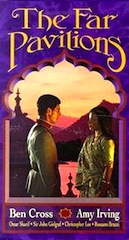
| |
Director: Peter Duffell, 1984
Based on the bestselling 1978 novel by M.M. Kaye, this miniseries is an epic of high
adventure in colonial India revolving around the romance between Anjuli, a half-caste
Indian princess, and Ash, a British officer raised in India. The Far Pavilions
drew upon and helped perpetuate a popular sense of "Raj nostalgia" in the early 1980s.
As such, it offers a lavish, entertaining, but highly romanticized vision of exotic
India under British rule.
© Acorn Media
|
|
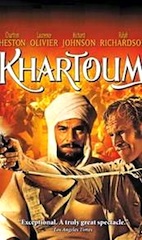
| |
Director: Basil Deardon, 1966
This Hollywood epic recounts the ill-fated struggle in 1885 of General Charles
Gordon and his British-Egyptian regiment to hold the Sudanese city of Khartoum
in the face of an attack by the forces of the Mahdi, a charismatic religious
leader bent on the expulsion of the British. Gordon's
Christian zeal and stubbornness meet their match against the messianic goal of the Mahdi to wage
a holy war against the foreign infidels.
© MGM/UA
|
|
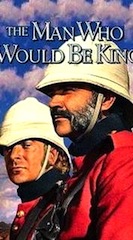
| |
Director: John Huston, 1975
This adaptation of the famous 1888 novella by Rudyard Kipling tells
the story of Daniel Dravot and Peachy Carnehan, two ex-soldiers
roaming through British India. They decide that the country is too
small for them, so they trek beyond the Northwest frontier to "Kafiristan"
in order to become kings in their own right. Kipling appears briefly
as a character in his own fictional tale.
© Warner Home Video
|
|
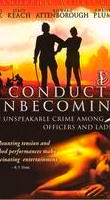
| |
Director: Michael Anderson, 1975
The plot revolves arounds a scandal in a British regiment stationed in India in the 1870s.
Lt. Drake is from a middle-class background and is eager to advance himself by making the
right impression. Lt. Millington, the son of a general, is not keen on army life and desires
to get out as soon as he possibly can. When the widow of the regiment's most honored hero
is assaulted, Drake must defend Millington from the charges in an unusual court-martial.
Based on the 1969 play by Barry England.
© Crown Films
|
|
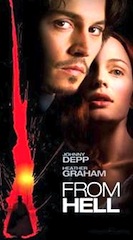
| |
Directors: Albert and Allen Hughes, 2001
A stylish and dark thriller based on the infamous Whitechapel murders of 1888 that
terrorized the residents of East London and baffled police. This is the most recent among
many popular films about "Jack the Ripper" and provides an artful recreation
of crime, poverty, and survival in the slums of Victorian Britain. The film's title "From Hell"
refers to the return address on one of the notes left by the Ripper. Based on the 1999 graphic
novel by Alan Moore and Eddie Campbell
© Fox Searchlight
|
|
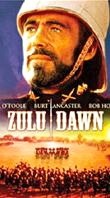
| |
Director: Douglas Hickox, 1979
This epic recounts the Battle of Isandhlwana fought on 22 January 1879
in Natal, South Africa. In the course of the fighting about 1,200 British soldiers
were massacred by a force of over 20,000 Zulu warriors and the regimental
colors were lost. Isandhlwana was the first engagement of the Anglo-Zulu War
and stands as one of the most shocking defeats in British military history.
Zulu Dawn was written by Cy Enfield as a prequel to his more successful
film Zulu released fifteen years earlier.
© Tango Entertainment
|
|
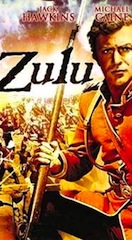
| |
Director: Cy Endfield, 1964
In 1879 the British Army suffered one of its worst defeats when
Zulu forces massacred 1,500 of its troops at Isandhlwana in South Africa. A short time after the
main battle a Zulu force numbering in excess of 4000 warriors advanced
on a British supply post at "Rorke's Drift" guarded by 139 Welsh
infantrymen. This film was made in the 1960s at a time when Britain's
colonial control over Africa was rapidly disintegrating.
© MGM/UA
|
|
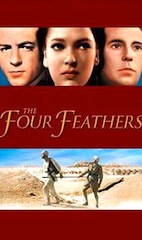
| |
Director: Zoltan Korda, 1939
A British army officer who resigns his commission on the eve of his unit's embarkation
on a mission against Sudanese rebels seeks to redeem his cowardice by secretly aiding his
former comrades disguised as an Arab. When his unit is overwhelmed and captured by the
rebels, the hero finds an opportunity to return the “feathers” of cowardice sent to him
by his former comrades by freeing them.
© MGM/UA
|
|
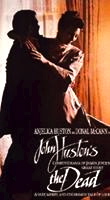
| |
Director: John Huston, 1987
An adaptation of one of the great short stories of
James Joyce. The plot revolves around a Christmas dinner at the
house of two spinster musician sisters and their niece in turn-of-the-century
Ireland, attended by friends and family. Among the visiting attendees
are the sisters' nephew Gabriel Conroy and his wife Gretta. The
evening's reminiscences bring up melancholy memories for Gretta
concerning her first, long-lost love when she was a girl in rural
Galway.
© Vestron
|
|
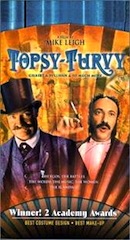
| |
Director: Mike Leigh, 2000
The legendary musical duo Gilbert and Sullivan are at a crossroads in
their careers. Having scored numerous hits like The Pirates of Penzance
and HMS Pinafore, they are mired in a creative dry spell. The plot revolves
around the inspiration for their comic opera The Mikado. Gilbert & Sullivan
operettas were extraordinarily popular among the very same Victorian society that they
satirized. Considered by many to be quinessentially English, they remain beloved by
audiences worldwide.
© USA Films
|
|
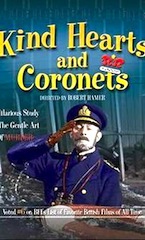
| |
Director: Robert Hamer, 1949
Set in Victorian England, this film remains the most popular of the postwar comedies produced
at Ealing Green Studios. Louis D'Ascoyne is the would-be Duke of Chalfont whose mother
was spurned by her noble family for marrying an Italian singer for love. Louis resolves
to avenge his mother by murdering the relatives ahead of him in line for the dukedom,
all of whom are played by Alec Guinness.
© Anchor Bay Entertainment
|
|
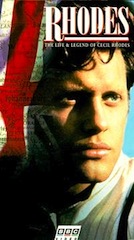
| |
Director: David Drury, 1996
This lavish miniseries tells the story of Cecil Rhodes, the Victorian entrepreneur and
champion of empire who, in the late nineteenth century, became one of the wealthiest men in the world.
The series chronicles Rhodes' arrival in South Africa as a teenager, his rise to power through
the acquisition of a vast gold and diamond fortune, his colonial ambitions for the British
Empire in Africa, and his influence in precipitating the Boer War.
© WGBH
|
|
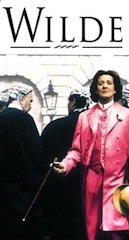
| |
Director: Brian Gilbert, 1997
An intimate portrayal of the life of poet, playwright, and novelist Oscar Wilde. The self-realization of his homosexuality caused Wilde enormous torment as he juggled marriage and fatherhood with his obsessive love for Lord Alfred Douglas. Wilde refused to flee the country when charged with "gross indecency" and was sentenced to two years hard labor. This film juxtaposes the genius of Wilde against the intolerance and hypocrisy of late Victorian Britain
© Columbia/TriStar
|
|
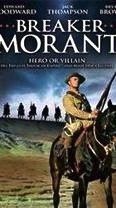
| |
Director: Bruce Beresford, 1980
The true story of three Australian army officers
serving in the Bushveldt Carbiniers, a unit of the British forces
fighting in the Boer War, who were court-martialed by the British
South African High Command for alleged atrocities. To this day many Australians
claim the men were scapegoats in an unpopular war. This courtroom drama reveals well the growing tensions between Britain and her imperial dominions.
Based on the 1979 play by Australian Kenneth Ross.
© Fox Lorber
|
|
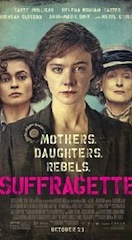
| |
Director: Sarah Gavron, 2015
Maud Watts, a young laundress from London, becomes involved with the Suffragettes, also called the Women's Social and Political Union (WSPU), a movement around the turn of the twentieth century that fought to achieve votes for women. Excluded from the established political system, the Suffragettes turned to dramatic and, at times, violent tactics to make their voices heard.
© Pathé
|
|
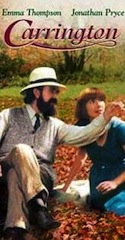
| |
Director: Christopher Hampton, 1995
This film recreates the lives of the Bloomsbury group of intellectuals and artists in
post-Victorian England, as seen through the relationship between the painter Dora Carrington
and writer Lytton Strachey. Carrington will not give herself to any of the men in her
life (including her husband)—at least not emotionally. Instead, she has found her
soulmate in Strachey, a homosexual who, in fact, is infatuated with Carrington's
husband.
© MGM/UA
|
|
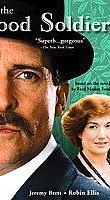
| |
Director: Kevin Billington, 1981
In the decade before the First World War, two wealthy and attractive upper class couples—one English, one
American—meet at a German spa and forge an immediate bond. Through nine seasons at the spa, the four
come to share with each other their same tastes, desires, and elegantly perfect Edwardian lives. Over
time, however, it becomes clear just how far short of perfection their lives really are. Based on the
1915 semi-autobiographical novel by Ford Madox Ford.
© Acorn Media
|
|
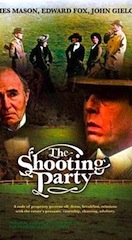
| |
Director: Alan Bridges, 1985
In the summer of 1913 a small group of lords and ladies gathers at the country estate of Sir Randolph Nettleby for a shooting party. A code of aristocratic propriety governs every aspect of the event—including speech, dress, dining, interaction with the estate's tenants, courtship, shooting, and even adultery. An accurate and nuanced portrayal of a way of life that on the eve of the First World War was already in the midst of an irreversible decline.
© Jef Films
|
|
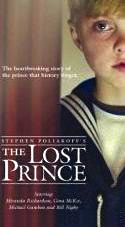
| |
Director: Stephen Poliakoff, 2003
The heartbreaking true story of Prince John, youngest child of King George V and
Queen Mary. His short and sad life spanned from the pomp of the Edwardian court through the turmoil
of the First World War. A loving, insightful, and humorous child, John suffered from epilepsy and
autistic-like learning difficulties and was diagnosed as an "imbecile". An embarrassment to his
image-conscious family, he was isolated from public view in one of the royal estates until his
premature death.
© BBC Films
|
|

